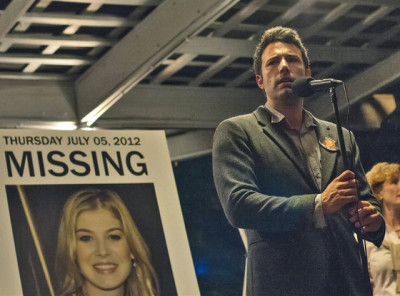Nick and Amy Dunne has been married for five years – in fact, she disappears on the morning of the couple’s fifth anniversary. At first, Nick seems appropriately upset, but gradually his behaviour seems to be in conflict with his declared desire to find her. Did he kill her?
Gone Girl is an exercise in misdirection – on all fronts. With a mid-point revelation that immediately changes everything we’ve seen so far, it is a darkly witty film that builds and maintains suspense right up to the final frame.
Because of the film’s structure – moving back and forth between Nick’s present and the events following his reporting of Amy’s disappearance and the story found in her diary, Gone Girl builds in suspense to an a certain level – until the big reveal. From that point on, the suspense doubles because everything we’ve seen to that point becomes darker and more strained.
I usually like to give a bit of a synopsis of a film’s opening before looking at technical stuff, but because of that big reveal, that might give away something crucial. Instead, I will say that the film (I haven’t read the novel, but now just might have to) is an examination of a marriage that looks great on the surface but is anything but underneath.
Instead, we have two beautiful people who have had to relocate because they’ve lost their high-paying jobs in New York City and might not have been the people they thought they were – with the result that there is a level of toxicity that only becomes apparent in retrospect.
At two-and-a-half hours, Gone Girl never moves hastily, but never drags. Director David Fincher establishes a tone that allows the soon to be unveiled nastiness inevitable.
As Nick’s world falls apart it doesn’t seem to matter whether he did it or not and his behaviour – here a wry smile taken out of context; there a manipulation that allows a damning photo to go viral – makes him seem a likely murderer. Ben Affleck may earn some awards consideration – or at least serious conversation – as he brings layers to a character that could have been very superficial.
As Amy Elliott-Dunne, Rosamund Pike may just have turned in a star-making performance. That’s all I’m going to say about that. She’s done wonders in smaller, pivotal roles – like the lawyer who doesn’t sleep with Tom Cruise’s character in Jack Reacher; or the bewildered friend who comes to the rescue in The World’s End – but this is something so far beyond that that it is a watershed moment in her career.
Special mention should be made of how Tyler Perry works the room as high-powered defense attorney Tanner Bolt, Missi Pyle sizzles as Nancy Grace-type inflammatory News-as-entertainment host Ellen Abbott, and Carrie Coon wins sympathy as Nick’s twin sister, Margo.
Kim Dickens also does a lovely job as open-minded police detective, Rhonda Boney, who is slowly persuaded that Nick is guilty – while Patrick Fugit nails the cynical officer Jim Gilpin who never doubts it for a second.
My only problem with Gone Girl is that it can, at times, seem like an exercise in audience manipulation (which all movies are, if we’re being completely honest) – there are moments where the strings seem a little bit too visible. Those moments are mostly in the film’s second half, so I won’t really be going into that – but I may have said too much, already.
Still, I’d see Gone Girl again in a heartbeat. It may be an exercise in manipulation, but it’s definitely an absorbing one.
Final Grade: A–
